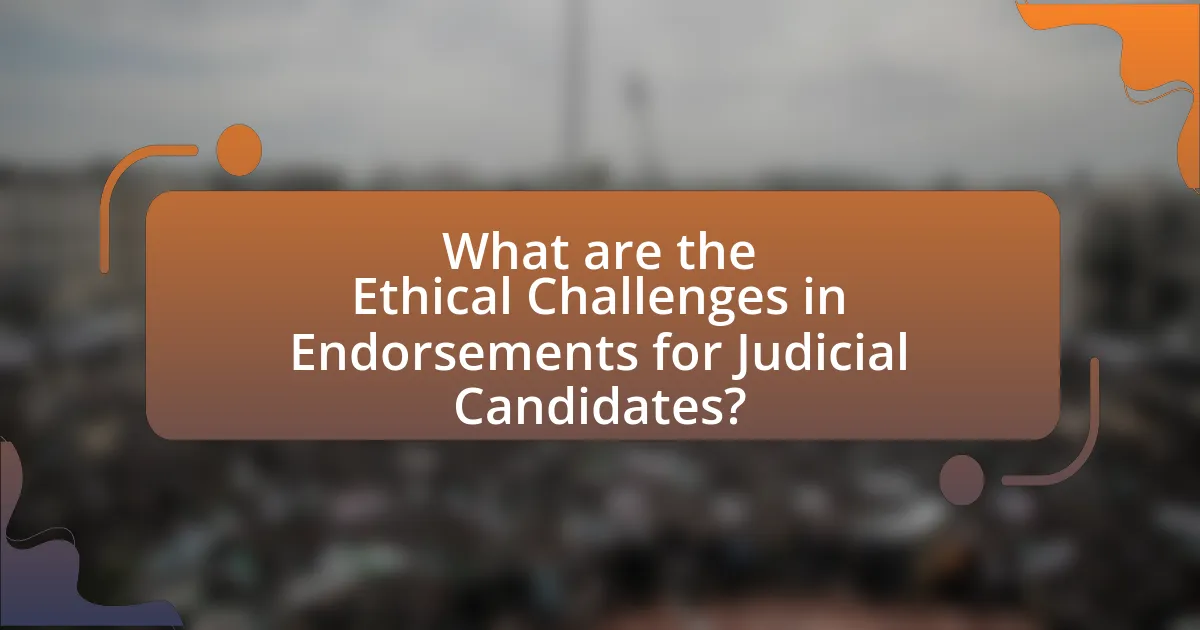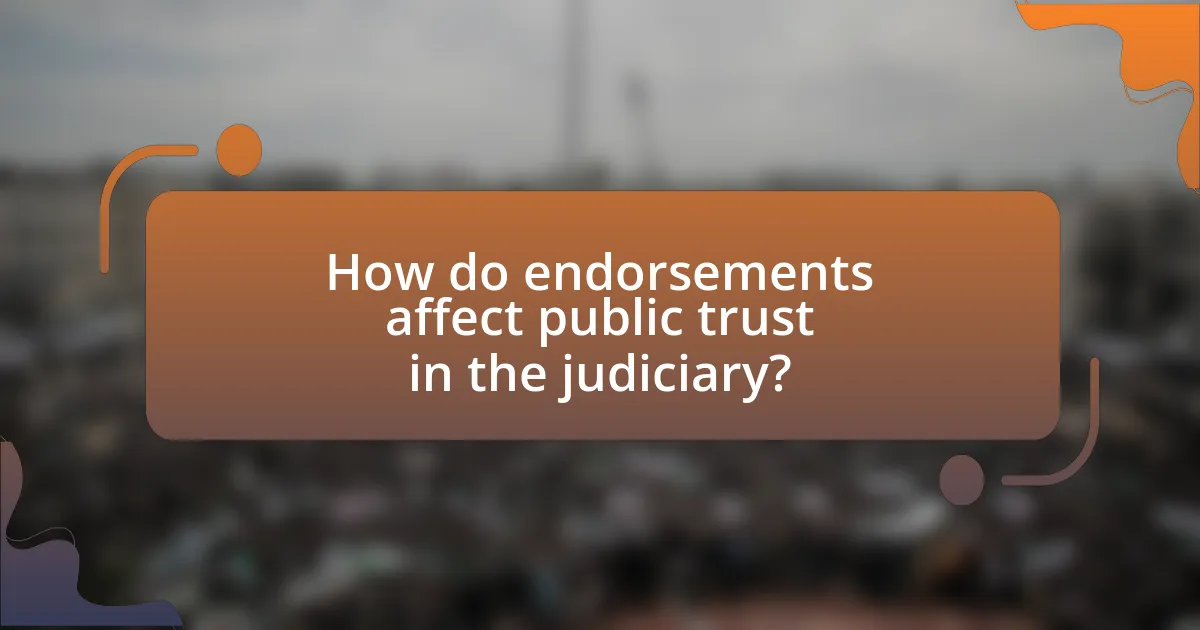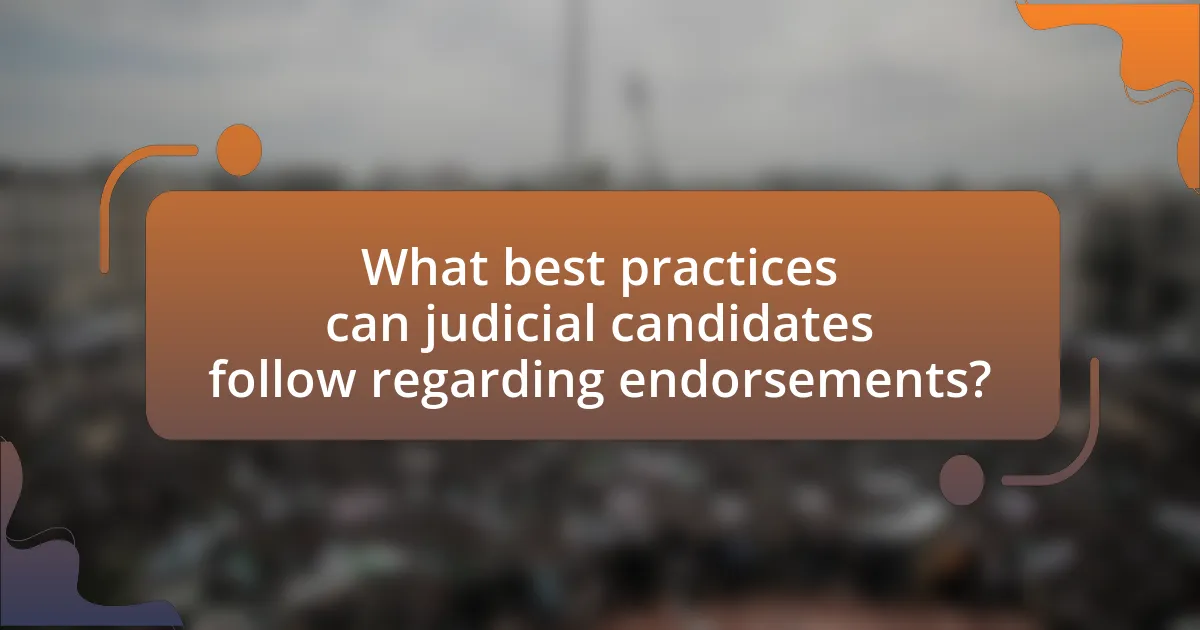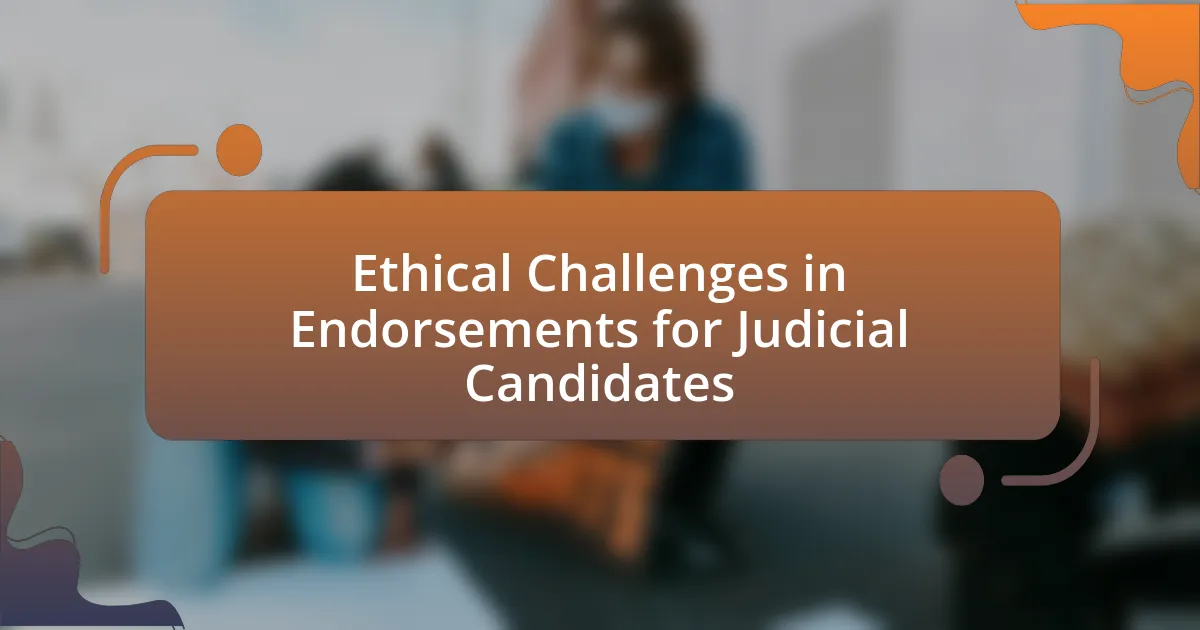The article examines the ethical challenges associated with endorsements for judicial candidates, highlighting concerns about bias and the potential erosion of judicial impartiality. It discusses the significance of endorsements in judicial elections, their impact on voter perceptions, and the integrity of the judicial system. The article also outlines the ethical dilemmas that arise from endorsements, including conflicts of interest and the implications of partisan endorsements. Additionally, it reviews existing regulations governing endorsements, the consequences of violations, and best practices for candidates to maintain ethical integrity while navigating endorsement dilemmas.

What are the Ethical Challenges in Endorsements for Judicial Candidates?
The ethical challenges in endorsements for judicial candidates primarily revolve around the potential for bias and the undermining of judicial impartiality. Endorsements can create perceptions of favoritism, leading to questions about a candidate’s ability to remain neutral in legal proceedings. For instance, when a judicial candidate receives endorsements from political parties or special interest groups, it raises concerns about whether those affiliations will influence their decisions on the bench. Additionally, the American Bar Association’s Model Code of Judicial Conduct emphasizes the importance of maintaining the integrity and independence of the judiciary, highlighting that endorsements may conflict with these principles. Such challenges necessitate careful consideration of the implications of endorsements on public trust in the judicial system.
Why are endorsements significant in judicial elections?
Endorsements are significant in judicial elections because they can influence voter perceptions and decisions, thereby impacting election outcomes. Judicial candidates often rely on endorsements from influential organizations, legal associations, and community leaders to establish credibility and trustworthiness. For instance, a study by the Brennan Center for Justice found that candidates endorsed by bar associations or prominent legal figures tend to receive higher voter support, as these endorsements signal professional approval and competence. This dynamic underscores the role of endorsements in shaping public opinion and guiding voters in their choices during judicial elections.
What role do endorsements play in influencing voter perceptions?
Endorsements significantly influence voter perceptions by providing credibility and social validation to candidates. When respected individuals or organizations endorse a candidate, it can enhance the candidate’s image and sway undecided voters. Research indicates that endorsements can increase a candidate’s perceived trustworthiness and competence, as voters often rely on the opinions of trusted figures to make informed decisions. For example, a study by the Pew Research Center found that 70% of voters consider endorsements from local leaders as important in their voting choices, demonstrating the tangible impact endorsements have on shaping voter attitudes.
How do endorsements impact the integrity of the judicial system?
Endorsements can undermine the integrity of the judicial system by creating perceived biases and conflicts of interest. When judicial candidates receive endorsements from political figures or organizations, it may lead the public to question their impartiality and independence in decision-making. Research indicates that endorsements can influence voter perceptions, potentially prioritizing political loyalty over judicial qualifications, which compromises the foundational principle of impartial justice. For instance, a study by the Brennan Center for Justice highlights that judicial elections influenced by endorsements often result in judges feeling pressured to align with the interests of their endorsers, thereby eroding public trust in the judiciary.
What ethical dilemmas arise from endorsements?
Endorsements for judicial candidates present ethical dilemmas primarily related to impartiality and conflicts of interest. When a candidate receives endorsements from specific organizations or individuals, it may create perceptions of bias, undermining the candidate’s ability to remain neutral in judicial proceedings. For instance, endorsements from law enforcement agencies could lead to questions about a candidate’s fairness towards defendants. Additionally, endorsements may pressure candidates to align their judicial decisions with the interests of their endorsers, compromising their ethical obligation to uphold justice impartially. These dilemmas highlight the tension between seeking support and maintaining the integrity of the judicial role.
How can endorsements create conflicts of interest for judicial candidates?
Endorsements can create conflicts of interest for judicial candidates by influencing their impartiality and decision-making. When a candidate receives endorsements from specific organizations or individuals, they may feel obligated to align their judicial decisions with the interests of those endorsers, potentially compromising their duty to uphold the law impartially. For instance, a study by the American Bar Association highlights that endorsements can lead to perceptions of bias, as candidates may prioritize the preferences of their supporters over fair adjudication. This dynamic raises ethical concerns regarding the integrity of the judicial process, as it can undermine public trust in the judiciary’s independence.
What are the implications of partisan endorsements on judicial impartiality?
Partisan endorsements significantly undermine judicial impartiality by creating perceptions of bias and favoritism. When judges or judicial candidates receive endorsements from political parties, it raises concerns about their ability to make decisions based solely on the law rather than political affiliations. Research indicates that voters often associate endorsements with a candidate’s alignment to specific political ideologies, which can lead to skepticism regarding their impartiality in future rulings. For instance, a study published in the “Journal of Politics” found that judicial candidates endorsed by partisan groups were perceived as less fair by the public, impacting their credibility and the public’s trust in the judicial system. This perception can ultimately erode the foundational principle of an independent judiciary, which is essential for upholding justice and fairness in legal proceedings.
What regulations exist regarding endorsements for judicial candidates?
Regulations regarding endorsements for judicial candidates primarily stem from the American Bar Association’s Model Code of Judicial Conduct, which prohibits judges and judicial candidates from personally soliciting endorsements. This regulation aims to maintain the integrity and impartiality of the judiciary. Additionally, many states have adopted similar rules that restrict judicial candidates from engaging in partisan political activities, including endorsements, to prevent conflicts of interest and ensure fair judicial processes. For instance, Rule 4.1 of the Model Code explicitly states that a candidate for judicial office shall not solicit or accept endorsements from any organization that is likely to appear before the court. These regulations are designed to uphold public confidence in the judiciary by ensuring that judicial candidates remain impartial and free from external influences.
How do state laws vary in regulating endorsements?
State laws vary significantly in regulating endorsements, particularly for judicial candidates, with some states imposing strict limitations while others allow broader discretion. For instance, states like California and New York have specific rules that prohibit judicial candidates from soliciting endorsements from certain organizations, whereas states such as Texas permit endorsements but require candidates to disclose them. These variations reflect differing state priorities regarding judicial impartiality and the influence of endorsements on public perception. The American Bar Association’s Model Code of Judicial Conduct provides a framework, but individual states adapt these guidelines to fit their legal and ethical standards, resulting in a patchwork of regulations across the country.
What are the consequences of violating endorsement regulations?
Violating endorsement regulations can lead to severe consequences, including disciplinary actions, fines, and potential disqualification from candidacy. Judicial candidates who breach these regulations may face sanctions from judicial oversight bodies, which can include censure or removal from office. For instance, the American Bar Association’s Model Code of Judicial Conduct outlines that violations can undermine public confidence in the judiciary, leading to reputational damage and loss of trust among constituents. Additionally, specific state laws may impose legal penalties, reinforcing the importance of adhering to endorsement regulations to maintain the integrity of the judicial system.

How do endorsements affect public trust in the judiciary?
Endorsements significantly affect public trust in the judiciary by influencing perceptions of impartiality and credibility. When judicial candidates receive endorsements from respected figures or organizations, it can enhance their legitimacy in the eyes of the public, leading to increased trust in their ability to uphold justice. Conversely, endorsements perceived as partisan or politically motivated may undermine public confidence, as they can suggest bias or favoritism. Research indicates that voters often rely on endorsements as a heuristic for evaluating candidates, which underscores their impact on public trust. For instance, a study published in the “Judicial Politics” journal found that endorsements from nonpartisan organizations positively correlated with higher public trust in judicial candidates, demonstrating the dual potential of endorsements to either bolster or erode trust based on their nature and source.
What perceptions do voters have about endorsed candidates?
Voters generally perceive endorsed candidates as more credible and trustworthy compared to those without endorsements. This perception is often influenced by the reputation of the endorsing individual or organization, which can enhance the candidate’s image and increase voter confidence. Research indicates that endorsements can significantly sway voter opinions; for instance, a study by the Pew Research Center found that 70% of voters consider endorsements important when making electoral decisions. This demonstrates that endorsements play a crucial role in shaping voter perceptions and can impact election outcomes.
How does public perception of endorsements influence judicial legitimacy?
Public perception of endorsements significantly influences judicial legitimacy by shaping the public’s trust in the impartiality and integrity of the judiciary. When endorsements come from respected figures or organizations, they can enhance the perceived credibility of judicial candidates, leading to greater public confidence in their ability to uphold justice. Conversely, if endorsements are viewed as politically motivated or biased, they can undermine the legitimacy of the judiciary, causing the public to question the fairness of judicial decisions. Research indicates that judicial candidates who receive endorsements from nonpartisan organizations tend to be viewed more favorably, as these endorsements are associated with a commitment to impartiality, thereby reinforcing judicial legitimacy.
What factors contribute to the erosion of trust in the judiciary due to endorsements?
Endorsements can erode trust in the judiciary primarily due to perceived bias and conflicts of interest. When judicial candidates receive endorsements from political figures or organizations, it raises concerns about their impartiality and independence. For instance, studies have shown that voters often associate endorsements with a candidate’s alignment to specific political agendas, which can lead to skepticism about their ability to make unbiased decisions. Additionally, the influence of money in political endorsements can further exacerbate these concerns, as financial backing may create an obligation to the endorsers, undermining public confidence in the judiciary’s integrity.
How can transparency in endorsements improve public trust?
Transparency in endorsements can significantly improve public trust by ensuring that the motivations and affiliations behind endorsements are clear and accessible. When endorsements are transparent, the public can better assess the credibility and integrity of the endorsers, which fosters a sense of accountability. For instance, research indicates that voters are more likely to trust judicial candidates who disclose their endorsements openly, as this practice reduces perceptions of hidden agendas or conflicts of interest. A study published in the Journal of Political Ethics found that transparency in political endorsements correlates with increased voter confidence in electoral processes, highlighting the importance of clear communication in building trust.
What measures can candidates take to disclose endorsements effectively?
Candidates can disclose endorsements effectively by utilizing clear and transparent communication methods. This includes prominently featuring endorsements on campaign materials, websites, and social media platforms, ensuring that the information is easily accessible to voters. Additionally, candidates should provide context for each endorsement, explaining the relationship with the endorser and the significance of the endorsement to their campaign. Research indicates that transparency in endorsements can enhance voter trust and engagement, as seen in studies showing that candidates who clearly communicate their endorsements often experience increased support from constituents.
How does transparency mitigate potential ethical issues in endorsements?
Transparency mitigates potential ethical issues in endorsements by ensuring that all relevant information regarding the endorsement process is disclosed to the public. This openness allows voters to understand the motivations behind endorsements, reducing the likelihood of perceived bias or conflicts of interest. For instance, when judicial candidates openly share their relationships with endorsers, it fosters trust and accountability, which are essential in maintaining the integrity of the judicial system. Studies have shown that transparency in political endorsements can lead to increased public confidence in electoral processes, as it diminishes suspicions of corruption or undue influence.

What best practices can judicial candidates follow regarding endorsements?
Judicial candidates should prioritize transparency and integrity when seeking endorsements. They must ensure that endorsements do not compromise their impartiality or the public’s perception of their independence. Candidates should carefully select endorsers who align with their values and judicial philosophy, avoiding affiliations that could raise ethical concerns or appear to influence their decision-making. Additionally, candidates should disclose all endorsements publicly to maintain transparency and build trust with voters. Research indicates that candidates who are transparent about endorsements are perceived as more trustworthy, which can positively impact their electoral success.
How can candidates navigate ethical challenges in endorsements?
Candidates can navigate ethical challenges in endorsements by adhering to established guidelines and maintaining transparency. Judicial candidates should familiarize themselves with the American Bar Association’s Model Code of Judicial Conduct, which emphasizes the importance of impartiality and integrity. By disclosing all endorsements and the nature of relationships with endorsers, candidates can mitigate potential conflicts of interest. Furthermore, candidates should seek endorsements from reputable organizations that align with their values and judicial philosophy, ensuring that these endorsements do not compromise their impartiality. This approach is supported by the fact that transparency in endorsements fosters public trust and upholds the ethical standards expected of judicial candidates.
What guidelines should candidates follow to maintain ethical integrity?
Candidates should adhere to transparency, honesty, and accountability to maintain ethical integrity. Transparency involves disclosing any potential conflicts of interest and ensuring that endorsements are based on merit rather than personal relationships. Honesty requires candidates to provide accurate information about their qualifications and experiences, avoiding exaggeration or misrepresentation. Accountability means being responsible for one’s actions and decisions, including accepting criticism and addressing any ethical breaches. These guidelines are essential as they foster public trust and uphold the integrity of the judicial system, which is crucial for maintaining the rule of law and ensuring fair judicial processes.
How can candidates balance endorsements with their judicial responsibilities?
Candidates can balance endorsements with their judicial responsibilities by adhering to ethical guidelines that prioritize impartiality and integrity. Judicial candidates must ensure that endorsements do not compromise their ability to remain neutral and fair in their judicial duties. For instance, the American Bar Association’s Model Code of Judicial Conduct emphasizes that judges should avoid any appearance of impropriety and should not allow their personal or political interests to interfere with their judicial responsibilities. By carefully selecting endorsements that align with their commitment to justice and by publicly affirming their dedication to impartiality, candidates can navigate the complexities of endorsements while upholding their judicial obligations.
What resources are available for candidates facing endorsement dilemmas?
Candidates facing endorsement dilemmas can access various resources, including legal guidelines, ethical advisory boards, and professional organizations. Legal guidelines, such as the American Bar Association’s Model Code of Judicial Conduct, provide frameworks for ethical endorsements. Ethical advisory boards, often established by state judicial conduct commissions, offer specific advice tailored to local regulations. Additionally, professional organizations like the National Association of Women Judges and the American Judges Association provide resources, training, and support for navigating endorsement challenges. These resources collectively help candidates understand their obligations and make informed decisions regarding endorsements.
Where can candidates find legal advice on endorsement issues?
Candidates can find legal advice on endorsement issues through state bar associations, which often provide resources and guidance on ethical standards for judicial candidates. Additionally, legal clinics and organizations specializing in election law can offer specific advice tailored to endorsement challenges. For example, the American Bar Association has resources that address the ethical implications of endorsements in judicial campaigns, ensuring candidates understand the legal framework surrounding their endorsements.
What organizations provide support for ethical campaigning in judicial elections?
Organizations that provide support for ethical campaigning in judicial elections include the American Bar Association (ABA), the Brennan Center for Justice, and the National Association of Women Judges (NAWJ). The ABA promotes ethical standards and guidelines for judicial candidates, while the Brennan Center conducts research and advocates for reforms in judicial election processes to enhance fairness and transparency. The NAWJ focuses on increasing diversity and ethical practices among judicial candidates, ensuring that campaigns adhere to ethical norms. These organizations collectively contribute to fostering integrity in judicial elections through advocacy, research, and the establishment of ethical guidelines.
